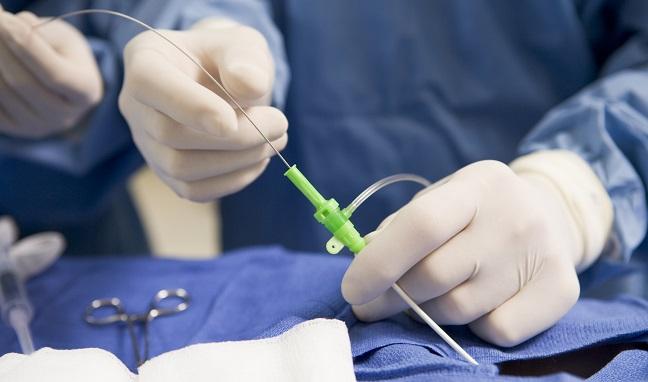Choosing the right Cardiologist near me: A patient’s guide to local heart experts
Choosing the right Cardiologist near me: A patient’s guide to local heart experts
Blog Article
Understanding the Significance of Cardiology in Modern Health Care Solutions
Cardiology plays an essential duty in modern healthcare, particularly as heart problem continues to be the leading cause of mortality worldwide. Developments in diagnostics and therapy have transformed client care, allowing earlier interventions and improved outcomes. The change towards preventive cardiology empowers individuals to handle their wellness proactively. As innovation continues to develop, the integration of innovative remedies might additionally redefine cardiology's influence on public health, prompting a more detailed assessment of emerging trends and their effects.
The Frequency of Heart Illness and Its Influence On Public Health
Although heart illness continues to be the leading cause of death around the world, its effect extends much beyond individual clients to impact public health systems and economic situations. The high occurrence of heart problem positions a considerable pressure on health care sources, requiring raised financing for treatment, rehabilitation, and avoidance programs. Public health and wellness efforts should address risk variables such as obesity, smoking, and less active way of lives, which add significantly to the climbing occurrence of heart conditions.Moreover, the financial concern connected with cardiovascular disease is tremendous, encompassing not only straight clinical expenses yet likewise indirect costs connected to shed performance and early death. Neighborhoods deal with challenges in managing these costs, frequently resulting in differences in health care access and results. As the populace ages and lifestyle-related dangers remain to escalate, the urgency for reliable cardiology interventions becomes paramount. Consequently, addressing cardiovascular disease is not just an issue of specific health and wellness however additionally a critical public health and wellness priority.
Breakthroughs in Cardiac Diagnostics and Imaging Techniques
Current developments in cardiac diagnostics and imaging strategies have actually transformed the area of cardiology, enhancing the ability to keep track of and discover heart problem. Techniques such as heart MRI, CT angiography, and echocardiography have actually become progressively sophisticated, providing in-depth pictures of heart frameworks and features. These methods enable the very early recognition of problems like coronary artery disease, cardiac arrest, and valvular disorders.Moreover, improvements in non-invasive diagnostics, such as wearable innovation and remote tracking tools, have encouraged clients and doctor. These tools assist in real-time tracking of heart rhythms and other important signs, leading to timely interventions. Additionally, expert system is being incorporated right into imaging evaluation, enhancing precision and effectiveness in medical diagnosis.
Innovations in Therapy Alternatives for Heart Issues
Current developments in cardiology have led to considerable developments in treatment choices for heart disease. These consist of advanced surgical strategies that boost step-by-step results and arising medications that use new avenues for therapy. As the field evolves, these developments play an important role in enhancing person care and end results.
Advanced Surgical Techniques
Innovations in medical techniques have changed the landscape of cardiology, using brand-new hope for patients with heart problems. Minimally intrusive treatments, such as catheter-based interventions, have actually considerably reduced healing times and hospital keeps. Techniques like robotic-assisted surgical treatment enhance accuracy, enabling doctors to browse complicated physiological frameworks with better accuracy. Additionally, improvements in imaging innovation assist in real-time visualization during procedures, boosting end results. Transcatheter aortic shutoff substitute (TAVR) exhibits an advancement in dealing with aortic stenosis, making it possible for shutoff substitute without open-heart surgical procedure. In addition, hybrid strategies that integrate catheter-based and surgical techniques supply customized solutions for different heart concerns. These sophisticated surgical strategies not only boost client safety and security yet additionally broaden treatment alternatives, highlighting the important role of technology in modern-day cardiology methods.
Emerging Therapies and drugs
As the landscape of cardiology remains to evolve, arising medicines and treatments play a pivotal function in enhancing therapy options for heart conditions. Technologies such as unique anticoagulants and advanced lipid-lowering agents have changed the administration of cardio conditions, considerably lowering individual morbidity and mortality. Additionally, the growth of genetics therapies and regenerative medication uses encouraging opportunities for dealing with problems previously deemed incurable. Professional tests are constantly revealing the efficiency of these treatments, pushing the limits of conventional therapies. The integration of digital health innovations facilitates tailored medicine, enabling for tailored treatment plans based on genetic and way of life variables. Jointly, these developments underscore the vibrant nature of cardiology, boosting patient outcomes and redefining criteria of treatment in contemporary healthcare.
The Function of Preventive Cardiology in Client Care
Preventative cardiology plays a necessary duty in individual care by concentrating on the identification of risk aspects that add to cardiovascular disease. With lifestyle modification techniques and early detection methods, medical care providers can successfully lower the incidence of cardio occasions - Cardiology. This positive strategy not only boosts person outcomes however also advertises lasting wellness
Danger Element Recognition
While cardio diseases continue to be a leading reason of morbidity and mortality worldwide, reliable threat variable identification serves as a keystone of precautionary cardiology. Recognizing risk elements such as high blood pressure, diabetes mellitus, hyperlipidemia, and family background is vital for very early treatment. Health care specialists make use of various screening methods to evaluate these aspects, enabling for customized safety nets. Additionally, comprehending a person's way of life choices, such as smoking and physical lack of exercise, additionally educates threat analyses. This comprehensive assessment enables medical professionals to develop individualized treatment strategies focused on mitigating threats. By prioritizing threat element identification, medical care systems can boost client end results and minimize the total problem of cardiovascular conditions, inevitably contributing to enhanced public health techniques and resource allotment.
Way Of Life Alteration Methods
A wide variety of research studies highlights the important role of way of life alteration strategies in lowering cardiovascular illness threat. These approaches encompass nutritional changes, raised physical activity, smoking cessation, and weight administration. By embracing a heart-healthy diet plan abundant in fruits, veggies, entire grains, and lean proteins, people can decrease cholesterol levels and high blood pressure. Regular exercise enhances the heart and improves overall cardio health. Furthermore, quitting cigarette smoking substantially lowers the threat of heart problem and boosts recuperation prices for those with status quo. Weight administration further adds to cardio health and wellness by reducing other threat elements such as diabetic issues and high blood pressure. from this source Applying these lifestyle transforms not only promotes private health yet likewise serves as a keystone of precautionary cardiology in individual care.
Very Early Discovery Methods
Way of life alterations significantly add to decreasing cardiovascular illness dangers, but they are most efficient when coupled with early detection methods. Preventative cardiology stresses the value of identifying prospective heart concerns prior to they escalate into major problems. Techniques such as blood stress surveillance, cholesterol screening, and advanced imaging innovations like echocardiograms play critical duties in examining cardio health and wellness. Biomarkers and genetic testing additionally improve the accuracy of early detection, permitting tailored precautionary techniques. Regular heart threat evaluations encourage health care carriers to interfere proactively, possibly preventing cardiovascular disease and strokes (Dr Garcia). By incorporating these very early detection techniques right into regular care, people can take advantage of prompt way of life treatments and targeted treatments, inevitably boosting end results and boosting lifestyle
Integrating Innovation Into Cardiology Practices
As advancements in innovation remain to improve different fields, the integration of cutting-edge tools and systems right into cardiology techniques has come to be vital for improving person care and results. Telemedicine platforms permit cardiologists to keep track of people remotely, enhancing accessibility to care while reducing the worry on medical care centers. Wearable devices, such as smartwatches, allow continuous heart rate tracking, signaling both medical professionals and people to prospective concerns in real-time. Additionally, expert system (AI) is being made use of to examine large amounts of heart information, assisting in very early medical diagnosis and individualized therapy plans. Advanced imaging methods, consisting of 3D echocardiography, improve visualization of heart structures, resulting in much more accurate interventions. Digital wellness documents (EHRs) improve individual info management, guaranteeing that cardiologists have immediate access to important information. With each other, these technical innovations are transforming cardiology, promoting positive administration and improved health results for individuals with cardiovascular conditions.
The Significance of Patient Education and Engagement
Individual education and engagement play an essential role in the administration of cardiovascular health. By outfitting individuals with knowledge about their problems, therapy alternatives, and lifestyle modifications, doctor encourage people to take an energetic function in their care. This aggressive approach can cause improved adherence to prescribed medications, nutritional modifications, and workout routines, inevitably reducing the risk of complications.Engagement likewise fosters a solid patient-provider partnership, motivating open communication and trust fund. When clients really feel notified and entailed, they are more probable to voice worries and ask questions, which can bring about much better scientific outcomes. In addition, instructional resources, such as workshops or electronic platforms, can improve understanding and promote self-management methods. In general, focusing on patient education and learning and interaction is necessary for enhancing cardiovascular health and wellness, improving quality of life, and minimizing medical care prices connected with heart diseases.
Future Fads in Cardiology and Their Possible Influence

Frequently Asked Inquiries
What Way Of Living Modifications Can Decrease Cardiovascular Disease Risk?
The existing concern addresses way of life changes that can greatly lower heart problem risk. Cardiology Jupiter. Adopting a well balanced diet plan, taking part in normal exercise, maintaining a healthy and balanced weight, handling tension, and staying clear of cigarette can notably boost cardio health
Exactly How Can I Recognize Very Early Indications of Heart Problems?
Acknowledging early indicators of heart problems entails tracking signs and symptoms such as breast discomfort, shortness of breath, exhaustion, and irregular heart beat. Timely recognition of these indicators can motivate required clinical assessment and treatment for better results.
What Are the Differences Between Cardiologists and Heart Surgeons?
The differences in between cardiologists and heart cosmetic surgeons exist in their roles; cardiologists mostly diagnose and handle heart problems via non-invasive techniques, while heart surgeons carry out medical procedures to fix architectural heart concerns. Each plays an important, click this link unique duty.

Just how Frequently Should I Get My Heart Wellness Checked?
The regularity of heart medical examination varies based on specific danger elements. Generally, grownups must go through evaluations each to 2 years, while those with existing problems might require even more regular assessments as advised by medical care experts.
What Role Does Genes Play in Heart Illness Threat?
Genes significantly affects heart illness risk, with domestic patterns indicating acquired conditions. Details genes can incline individuals to high blood pressure, cholesterol problems, and other cardio problems, highlighting the value of genetic testing in evaluating heart wellness. Heart disease stays the leading cause of death globally, its effect expands far past individual clients to affect public health and wellness systems and economic situations. Public health and wellness campaigns should attend to risk aspects such as excessive weight, cigarette smoking, and less active lifestyles, which contribute substantially to the rising incidence of heart conditions.Moreover, the financial burden connected with heart illness is tremendous, encompassing not only straight clinical costs yet also indirect expenses associated to shed performance and premature mortality. Precautionary cardiology plays an essential role in client treatment by concentrating on the recognition of risk elements that contribute to heart illness. Fabricated knowledge (AI) and machine knowing are improving diagnostics and individual surveillance, making it possible for very early discovery of heart diseases. The differences between cardiologists and cardiac cosmetic surgeons lie in their functions; cardiologists this contact form mostly identify and handle heart problems via non-invasive approaches, while heart doctors execute medical treatments to remedy architectural heart problems.
Report this page